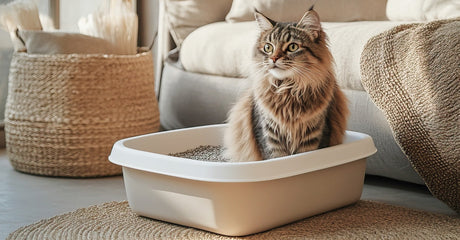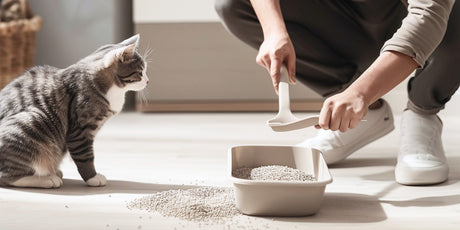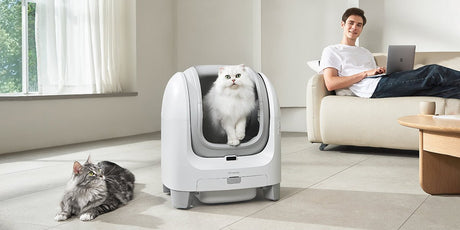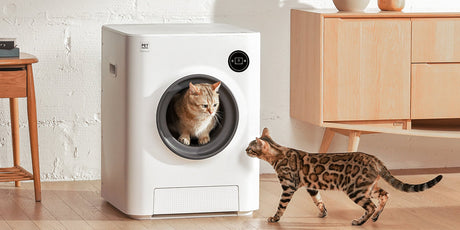The world is so fair! While you enjoy petting your soft cat, you must endure the frustration of cat hair getting into every corner. There are many benefits to living with a cat, but when it comes to drawbacks, besides the trouble of dealing with cat hair, the other main concern is odor control for cat litter box in house. Today, we provide 25 different smell solutions to tackle this problem, hoping at least one of them will genuinely help you.
Part 1: The Source
Cats
To solve the problem, you need to stop it from being a problem in the first place. I'm not suggesting you get rid of your cat, but get rid of things that are harmful to them, and find things that are beneficial.
1. Get rid of low-quality cat food with excessive starch (ingredients like corn and wheat listed first). Opt for high-quality cat food, which usually contains a higher proportion of animal protein, adequate fats, and balanced carbohydrates.
2. Increase water intake. Consider using an automatic water fountain to encourage your cat to drink more and ensure they have fresh water available at all times. Providing wet food is another important way to increase hydration.
3. Promote digestion. Choose cat food designed to control odors or with higher digestibility, or add probiotics specifically for cats to reduce undigested food residue, thereby reducing bad odors.
4. Litter training. Ensure that your cat had litter training as a kitten, whether intentionally or not. This includes learning to use the litter box, poop in right place, burying feces, and covering ammonia-scented urine. This step is more important than anything we will mention later.

Litter
5. Choose a highly effective odor-blocking kitty litter. Litter with added fragrances generally works better than nonscent litter, and deodorized litter often performs even better with smell control. Commonly mentioned types of litter include bentonite, pine, and crystal litter.
6. Maintain proper litter depth. Keep the litter about 2-4 inches deep to ensure that the cat can fully bury its waste, reducing the spread of odors.
Litter Box
7. Sufficient space. Many commercial litter boxes are too small, restricting your cat's natural behavior. If we don't realize this and blame the cat, it's unfair to them.
8. Enough quantities. This is particularly important for multi-cat households or owners who are frequently away. For every cat, it's a good idea to add one more litter box. For example, 3 cats should have 2 boxes, 4 cats should have 3, and so on.
9. At least a covered waste box. A covered litter box helps control odors, but can be less healthy for the cat. An open litter tray, on the other hand, is the opposite. An open top litter box, however, combines the advantages of both—a covered waste collection area that stops odor coming out with an open toilet space, which effectively controls odor dispersion.

Part 2: Deodorizers
Natural Cat Litter Deodorizer
10. Baking Soda. A classic choice, its strong absorbent ability can trap and neutralize odors. Sprinkle it on the litter or mix it into the litter.
11. Activated Charcoal. Another classic option, an excellent absorber that neutralizes odors. Granules can be mixed with the litter, or packaged ones can be placed near or inside the litter box.
12. Essential Oils. Use natural plant extracts like citrus, peppermint, lavender, or tea tree oil to cover or neutralize odors. They are usually sprayed on, but must be used in small amounts since some essential oils can be harmful to cats.
13. Other Natural Substances. There are other less common natural deodorizers, such as natural minerals like zeolite, plants like cedar chips, or plant extracts like cornstarch. These are usually mixed with the litter.

Active Enzymes
14. Enzyme-based Products. Commonly found in eliminator spray, a thorough odor remover, these break down the organic compounds that cause odors, converting them into odorless substances like water and carbon dioxide. However, they are mostly used for deodorizing areas where your cat has urinated or defecated outside the litter box.
Part 3: Environment
Choosing the Right Environment
15. Good Airflow. Place the litter box in a well-ventilated area to help dissipate odors and keep the air fresh. Another way, building a cat room for your felines.
16. Temperature and Humidity. Avoid placing the litter box in direct sunlight, or in a damp or excessively hot area, as these conditions can promote bacterial growth, leading to stronger odors.

Improving the Environment
17. Use an Ionizer. You can find this type of product on Amazon (negative ion smart deodorizer). They are kind of eliminators can be rechargeable. However, customer reviews are mixed regarding their effectiveness, battery life, and longevity.
18. Use an Air Purifier. Choose an air purifier that effectively smell removal to improve air quality. Avoid using simple air fresheners, as they can even have the opposite effect.
Part 4: Cleaning
19. Scoop the Litter Daily. The most direct way to get rid of litter box is cooping out clumps and waste daily, or more frequently, to prevent odors from accumulating. If you're tired of this chore, consider investing in an automatic litter box. The initial cost is higher, but it's worth it in the long run!
20. Change the Litter Regularly. After extended use, cat litter may harbor bacteria and cause odors. Changing the litter regularly helps reduce this.
21. Clean the Litter Box in Time. Some urine and feces will inevitably stick to the inner walls of the litter box. Check and clean it regularly with plain soap and a sponge, and if needed, use vinegar or a disinfectant to thoroughly clean the box.
22. Replace the Litter Box. Over time, a litter box can develop scratches, and these areas can accumulate waste, promoting bacterial growth and odor. As the scratches increase, this problem worsens.

Part 5: Consult a Vet
If your litter box smells worse than your friend's, despite the same conditions, consider the possibility of health issues, and seek help from a vet. Also, make sure to avoid diseases as much as possible in daily life.
23. Regular Health Check-ups and Nutritional Advice. Have a vet perform a thorough check-up on your cat, including weight, teeth, ears, skin, and overall health. Based on age, weight, and health, the vet can offer suitable dietary advice.
24.Vaccinations and Deworming. Preventing diseases is key to reducing the chances of serious illnesses.
25.Emergency Care. If your cat experiences diarrhea, vomiting, or other health issues, the litter box may have a stronger odor. It's important to regularly check the condition of your cat's waste.
Conclusion
By taking care of your pet's health, choosing the right litter, litter box, and deodorizers, along with regular cleaning and scientific management, you can effectively reduce litter box odors and create a fresher, more comfortable living environment. This not only improves the quality of life for both you and your cat, but also benefits both your physical and mental well-being. I hope this information helps! If you have any effective tips for reducing litter box odors, please share them in the comments.







